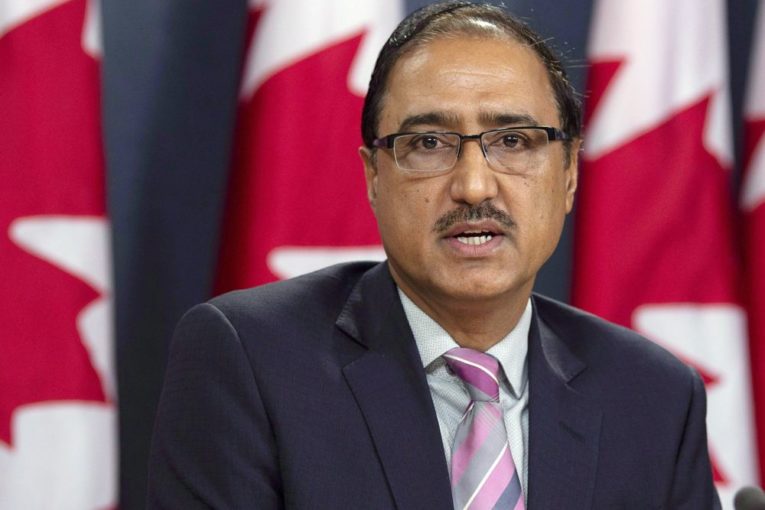
If the Alberta government is waiting for Ottawa to help pick up the $3.7-billion tab to lease rail cars in the coming months, I’m not sure it will ever get what it wants.
And if the province and oilpatch are hoping the Trudeau government will kill its oil tanker moratorium off the northern British Columbia coast — as the Canadian Association of Petroleum Producers (CAPP) urged Thursday — I’d firmly put the request in the ain’t-going-to-happen bucket.
In an interview Thursday, federal Natural Resources Minister Amarjeet Sohi did not categorically reject the Notley government’s request it help pay for leasing 4,400 rail cars to bolster crude-by-shipments out of the province, but left the key question unanswered.
The province approached Ottawa last fall for financial assistance for its rail strategy, coming at a time when Western Canada’s oil production exceeded pipeline capacity by about 365,000 barrels per day.
The glut led to a crippling discount for Alberta crude, costing the industry, province and country millions of dollars a day, which ultimately led the province to mandate production cuts.
Sohi asked the National Energy Board for advice and options to optimize pipeline capacity out of Western Canada. The report is now done and expected to come out imminently.
The Edmonton MP said he’s not yet in a position to say if Ottawa will support the province’s request, but instead referred to $700 million that’s already available to finance infrastructure projects through the federal National Trade Corridors Fund.
“We can potentially fund some projects that will make the (rail) network more efficient and also help with the movement of other commodities,” he said.
“If the Alberta government has projects that they think will help them move oil by rail and (improve) overall efficiency of the network, we will absolutely be open to working with them.”
But that’s not a commitment.
That’s being told to get in line and apply for cash.
The vague response won’t satisfy the province, which estimates the rail program will generate $5.9 billion in increased royalties, taxes and commercial revenue, leading to a $2.2-billion profit.
“They don’t seem to be able to make their mind up,” said Alberta Energy Minister Marg McCuaig-Boyd, who insisted the province will move ahead with the plan.
“Thousands of Alberta jobs (are) on the line, we have got product we need to move, and doing more studies or looking at the whole system down the road . . . is not helpful now.”
To make the matter more complicated, UCP Leader Jason Kenney has already vowed to kill the rail program if his party wins the upcoming spring election, which might be another reason for the feds to drag their feet.
One thing is clear: With Enbridge’s Line 3 pipeline project delayed until the second half of 2020, pressure is mounting on rail to pick up the slack.
All of these topsy-turvy developments have left Canada’s oil and gas sector with a sense of political vertigo, increasingly frustrated and uncertain about the future.
In a report issued Thursday on diversifying Canada’s oil and gas markets, CAPP put forward a series of recommendations on ways the government can help resolve the ongoing market-access problems.
It wants a major overhaul of Bill C-69, a contentious piece of proposed legislation that will affect the way major energy projects are reviewed by Ottawa.
The industry group also wants the feds to withdraw the tanker moratorium, Bill C-48, and to issue “a clear government commitment to resource development.”
The Trudeau government’s oil tanker ban killed the Northern Gateway project, and it would also stop the proposed Eagle Spirit pipeline from moving ahead.
“When we saw projects like Northern Gateway get approved and then cancelled for political reasons after the last election, that sent a very clear message to the world,” said CAPP president Tim McMillan.
“That is one of the most damaging messages that we can put out.”
Sohi noted the Senate is now considering amendments to both bills, yet left little doubt the tanker moratorium would move ahead.
Despite these obvious flashpoints, the minister said he’s “puzzled” by talk that some oilpatch players think the Trudeau government doesn’t want the sector to expand.
He points out Ottawa bought the Trans Mountain pipeline to keep it alive, and backs Keystone XL and Line 3 to be built.
“We want this sector to grow,” he said.
“If we were not supporting the oil and gas sector, why would we invest $4.5 billion in a pipeline project that otherwise would have died, right?
“Why were we spending time advocating for Enbridge Line 3 and Keystone XL pipeline if we were not committed to this sector?”
But none of those projects have been built. They could be years away from completion.
Canada needs pipelines today, not two years from now.
If Sohi is puzzled by the oilpatch’s attitude, he should call Tamarack Valley Energy CEO Brian Schmidt.
Schmidt said he’s spending many hours each week fighting Bill C-69 and believes it will make it nearly impossible for any new pipelines to be built in Canada, choking off growth for the industry.
If Ottawa is interested in restoring confidence in the sector, it would amend the legislation, said the veteran oilman.
“I don’t believe the federal government wants to see us grow production,” Schmidt said.
“The track record is why industry is so skittish. It’s not that difficult to figure out.”
Whether it’s on rail or pipeline issues, the federal minister faces deep mistrust today that the Liberal government wants to see it succeed.
Buying a pipeline project isn’t enough. It has to find a fix and finally get energy infrastructure built.
Chris Varcoe is a Calgary Herald columnist.
You can read more of the news on source
